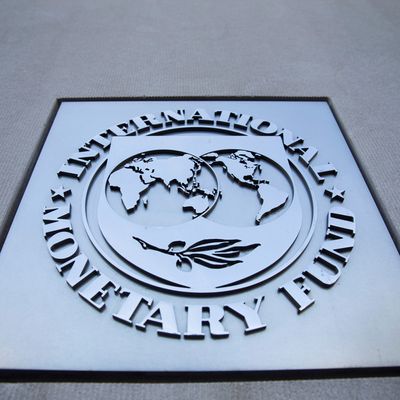
Humanity is $152 trillion in debt, putting us deeper in the red than we’ve ever been, according to the International Monetary Fund’s Fiscal Monitor.
Gross debt in the nonfinancial sector has more than doubled (in nominal terms) since the dawn of this century, with borrowing outpacing global growth. In 2002, gross debt amounted to 200 percent of gross domestic product — in 2015, that figure was 225 percent.
Two-thirds of that $152 trillion is held by households and nonfinancial firms. The rest resides on government balance sheets.
While there is no consensus on what constitutes an unhealthy global debt-to-GDP ratio, rapid increases in private debt are often followed by financial crises. And when such crises produce recessions, the overhang of that private debt tends to prolong them — it’s hard to stimulate demand when consumers plow any new earnings into catching up on their mortgage payments.
The combination of slow growth and high debt threatens to set off “a vicious feedback loop in which lower growth hampers deleveraging and the debt overhang exacerbates the slowdown,” the fund wrote.
The one-two punch of too much debt and too little growth presents a conundrum for policymakers: On the one hand, the IMF wants lower global debt; on the other, it wants governments to pursue more deficit spending to boost demand. Per the Financial Times:
Calls for what are often dubbed “growth-friendly fiscal policies” have grown from the IMF and other multilateral institutions as concern has mounted that the world’s central banks have been left with too much of the burden to lift the global economy.
These two imperatives aren’t quite as contradictory as they may appear on first glance: If fiscal stimulus spurs growth, then government debt will, eventually, go down. What’s more, some governments are more indebted than others — those with more fiscal breathing room could lead the charge on spurring global demand through expansionary fiscal policy.
Still, there remains significant tension between these goals. One policy that could (theoretically) resolve that tension is money-financed fiscal expansion — which is to say, just printing new money and either investing it in stimulus projects or putting it straight into consumers’ bank accounts.
While such a suggestion was once taboo, it’s gained traction over the past year with a number of mainstream economic thinkers, including former Federal Reserve chair Ben Bernanke.
One of the more eloquent advocates for “monetary finance” is Adair Turner, the former chairman of the United Kingdom’s Financial Services Authority. Here’s how Turner summarized the nutshell case for “helicopter drops” in May:
As I argued in a recent International Monetary Fund paper, the technical case for monetary finance is indisputable. It is the one policy that will always stimulate nominal demand, even when other policies – such as debt-financed fiscal deficits or negative interest rates – are ineffective. And its impact on nominal demand can in principle be calibrated: A small amount will produce a potentially useful stimulus to either output or the price level, whereas a very large amount will produce excessive inflation.
The most powerful critique of monetary finance is political: Once governments break the taboo against spending without taking on debt or raising taxes, citizens will demand more and more until their economies are wracked by hyperinflation.
Turner acknowledges the validity of this objection, but finds it unconvincing:
After all, other policies to support demand growth, or a failure to implement any policy, can be equally dangerous. It was deflation, not hyperinflation, that destroyed the Weimar Republic. Hitler’s electoral breakthrough of 1932 was achieved amid rapidly falling prices.
And alternative policies will in some circumstances have adverse side effects. The root cause of today’s problems was excessive private credit growth before 2008. If our only way out is interest rates negative enough to re-stimulate that rapid growth, we are doomed to repeat past mistakes.
Moreover, there is no reason why we cannot construct rules and responsibilities to mitigate the political risk of excessive use. Bernanke, for example, has proposed giving independent central banks the authority to approve a maximum quantity of monetary finance if they believe doing so is necessary to achieve their clearly defined inflation target.
The global economy is in uncharted waters. Perhaps it will take novel measures to guide it back to familiar seas.






























